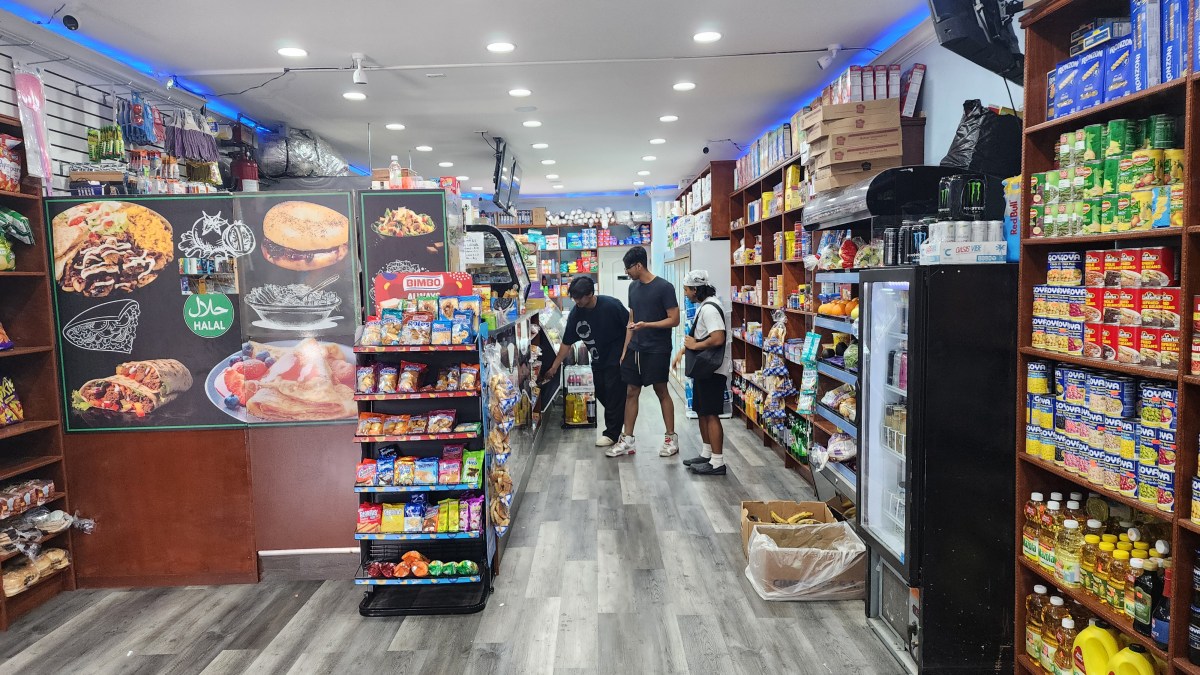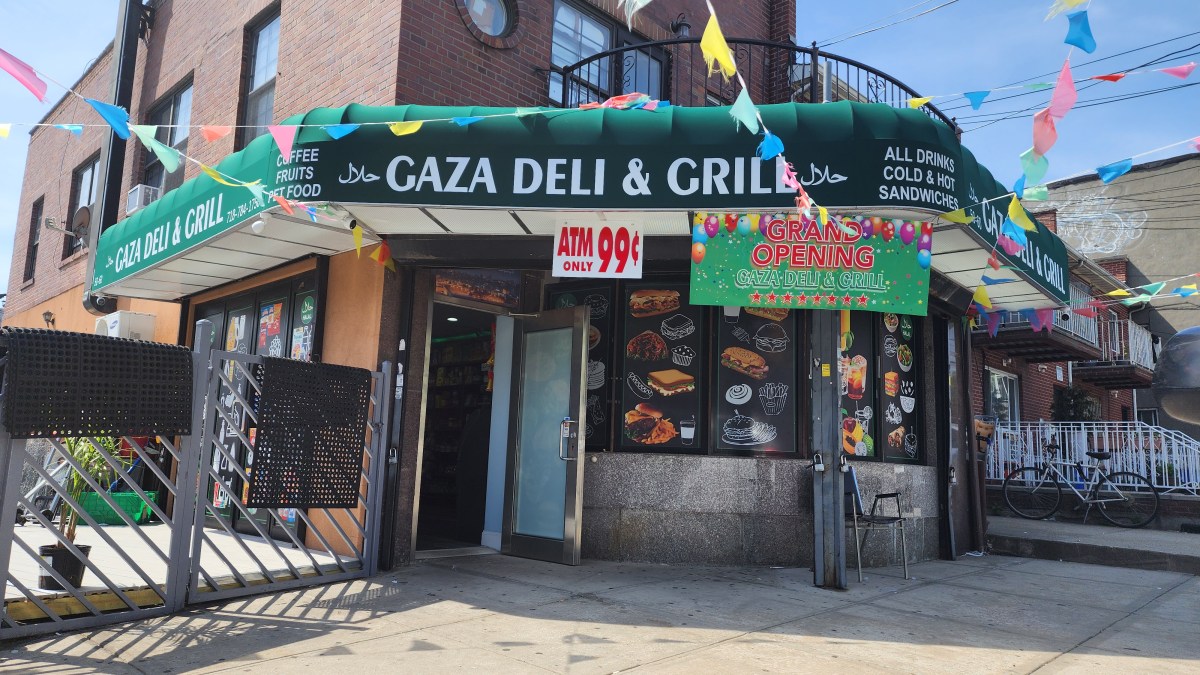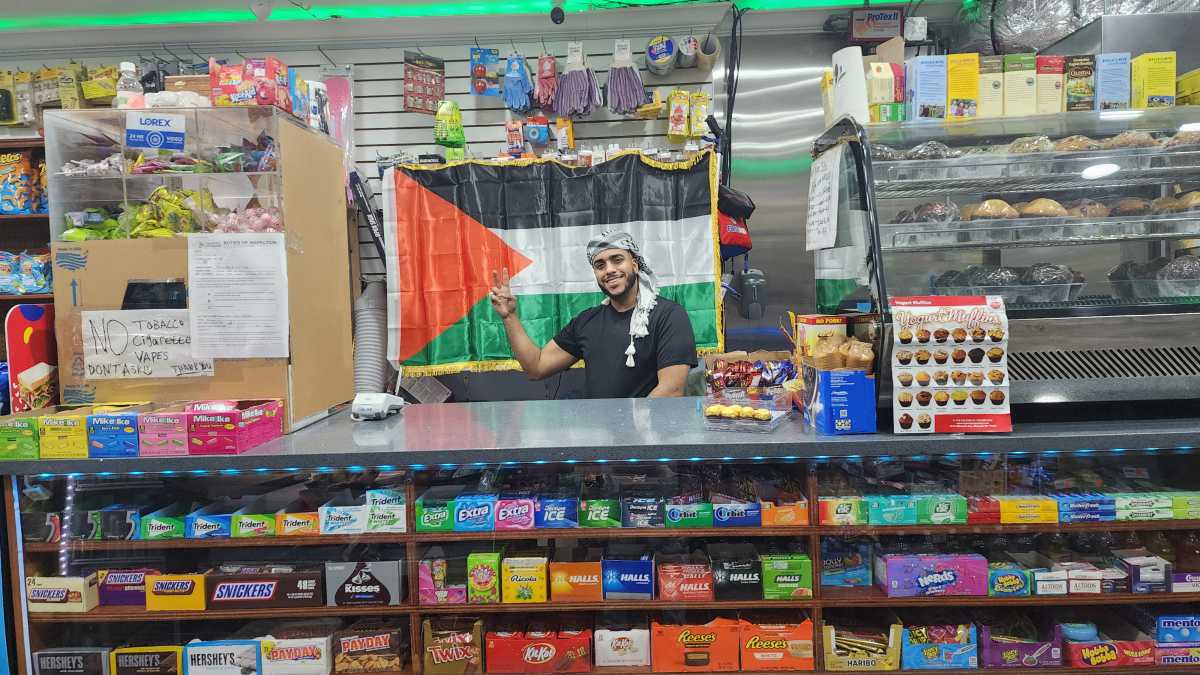As the casualties began to mount from the Israeli bombing campaign in Gaza last year, the owner of a nondescript bodega in Woodside decided to change the name of the business to Gaza Deli– in solidarity with his mother, who is from the war-torn Palestinian territory.
Bilal Alghazali, who bought the bodega three years ago, has been subject to harassment and praise since he changed the store name from AAA Deli to Gaza Deli in February to raise awareness of the plight of Gazans. Since making the change, he has received death threats, scathing online reviews, and nasty phone calls.
Despite its attention-grabbing name, there is nothing out of the ordinary about Gaza Deli. The name, he said, has generated a mostly positive response from the Woodside/Sunnyside community, with most of the hostility coming from afar. While some have tried to hurt the reputation of the business, Alghazali remains undeterred.
“Gaza has stood strong and hasn’t given up; neither will I give up speaking up for my people,” Alghazali said. “No amount of money, threats, or censorship can stop me.”
The neighborhood around Gaza Deli is mostly Latino, with some Asians and Bangladeshis—with most residents being indifferent about the name, he said. The backlash, he believes, has come from anonymous haters from outside the area.

In many ways, Gaza Deli—located across the street from a cemetery on the corner of 48th Street and Laurel Hill Boulevard—is a typical Arab-owned store. It offers breakfast food and sandwiches and sells drinks such as $1 Arizona beverages, but no alcohol or pork products. Hispanic items like tall prayer candles, Valentina hot sauce, and La Morena pickled jalapeno cans are lined next to Italian pasta and fresh groceries.
Alghazali, who wears a Palestinian keffiyeh, was raised in Brooklyn and Queens by a Yemeni father and a Palestinian mother. He is a native New Yorker and is a college graduate with an electrical engineering degree.
Alghazali, who now lives in Glendale, said he has received dozens of death threats from people calling the store as well as on his cell phone. He said he is worried about his workers, who don’t know how to respond to such viscousness.
His business has also been subject to multiple bad reviews on Google by people using fake accounts. He said he had succeeded in getting them removed by contacting the tech company.
Alghazali said he is deeply troubled by what is going on in Palestinian territories, and especially in Gaza. He knows how hard it is for Palestinians just to exist and live peacefully, as he has firsthand experience of that.
Alghazali said he had the most traumatic experience of his life in Jerusalem while visiting his family in the West Bank. For instance, in September—one month prior to the Hamas terrorist attacks– he was arrested by Israeli soldiers for carrying a Palestinian flag and was detained for one day. While detained, he said, he was denied medical attention for his asthma and denied legal representation. He said he was charged for carrying a “terrorist flag.”
He said the incident was traumatic because he had never been arrested and that he was charged for something Americans wouldn’t even question, which was peacefully waving a flag. He said he was completely abandoned by the American embassy, and it was even more traumatic for his mother, who was with him when this all happened.
He said that he had always considered himself to be a Yemeni American, but the experience has caused him to also focus on his Palestinian heritage, prompting him to change the store’s name. He said he always speaks up because that is the American part of him.
Alghazali said that 10% of Gaza Deli’s profits go to American-licensed charities that help people in Palestine.
Alghazali said he has a group of friends that includes New Yorkers of all backgrounds, including Jews. He said he offers kosher products at his deli and wants everyone to know that they are welcome at his store.

Most local residents are unphased by his store.
Jair Rojas, 28, a Peruvian-American construction worker who lives on the same street as Gaza Deli, said he is fine with the name, and he guesses most Hispanics in the community would be as well. In fact, he said, he likes it because it is easy to remember, given that Gaza is all over the news. However, he is concerned that the store could be vandalized.
Abdullah, a Bangladeshi American who lives on the same block as the store but didn’t want to provide his last name, said he took a picture of it when he first noticed the new name.
He said he sent the photo to his friends, who welcomed it but also noted that they hoped the store had good insurance in expectation of vandalism. He also praised the owner for his activism, saying that the new name will make people think about the death, destruction, and hunger that is happening in Gaza while they are happily buying food at the grocery store. The name Gaza to him carries a lot of meaning and brings emotions of sadness and outrage.
“I know that Gaza is just a place name that means nothing to some people, but that is unacceptable. How could it be just a place anymore,” Abdullah said.
John Roberts, who has been working as a project manager at a construction company near Gaza Deli for about eight years and is a regular customer, praised the owner.
He said people who are bothered by the name Gaza are ignorant and don’t know what it means. He said it is just a destination, a place. It is like not liking the word Brooklyn because someone is from the Bronx. But he said he is not surprised by people who are offended.
“For someone in this day and age to see something and have an exaggerated opinion is typical of the sad world we live in,” Roberts said.

































